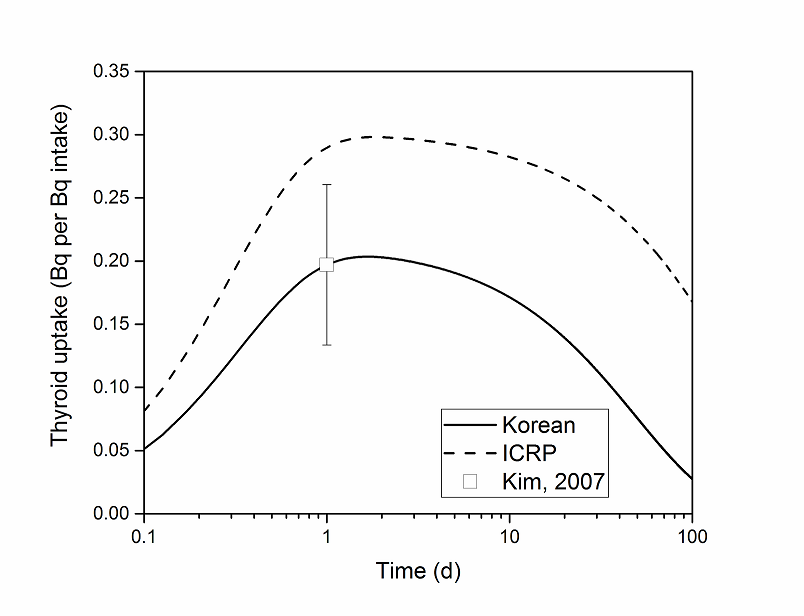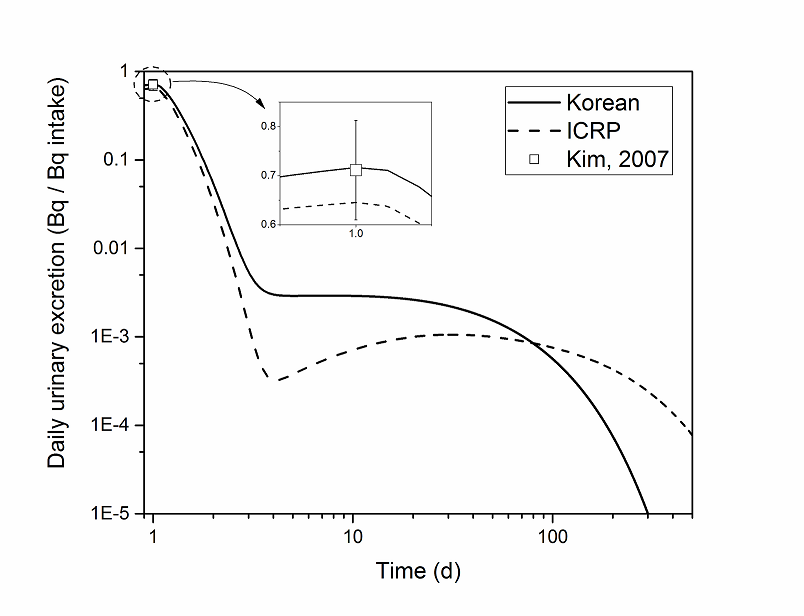글로벌 연구동향
방사선방호 및 안전
- 2021년 08월호
[J Radiol Prot.] Korean-specific biokinetic model for iodine in radiological protection 방사선 방호 목적에서 방사성 요오드에 대한 한국인 고유 생리역동학 모델한양대 / 권태은, 정윤선*
- 출처
- J Radiol Prot.
- 등재일
- 2021 Jun 1
- 저널이슈번호
- 41(2). doi: 10.1088/1361-6498/abd842.
- 내용
-
Abstract
The International Commission on Radiological Protection (ICRP) recently adopted a detailed biokinetic model for systemic iodine with reference transfer coefficients based on typical worldwide dietary intakes of stable iodine. The regional data provided demonstrate that the ICRP reference thyroidal biokinetics may differ substantially across regions with atypically low or high dietary intakes of stable iodine. Importantly, the design of the ICRP model facilitates modifications of reference thyroidal kinetics based on regional dietary iodine intake. The present study extended the ICRP model to the South Korean population, whose dietary iodine intake is much higher than the global mean. The following three transfer coefficients were selected as targets for Korean-specific values: thyroidal uptake rate (λ1), hormonal secretion rate (λ4) and leakage rate of thyroidal organic iodine as inorganic iodide (λ5). The Korean-specific values forλ1,λ4andλ5were determined to be 4.48, 0.0086 and 0.0171 d-1, respectively, to yield the measurements of thyroidal iodine and physiological status of Korean adults. The determinedλ1andλ5values differed noticeably from the ICRP values, whereas theλ4value was comparable to that of the ICRP. Compared with the ICRP reference model, the Korean model, in which the Korean-specific transfer coefficients were adopted, predicted noticeably lower thyroidal uptake and faster decrease of thyroidal iodine. In addition, the predicted cumulative activities of radioiodine in the thyroid were substantially lower (40-80%) than those predicted by the ICRP model. The Korean model developed in this study demonstrates that the iodine biokinetics for Koreans (i.e. a population with a high iodine consumption) obviously differ from the prediction of the ICRP model. Hence, the Korean model may serve to improve the accuracy of thyroid dose estimation for Koreans and will lead to practical changes in matters concerned with radiological protection.

Affiliations
Tae-Eun Kwon 1 2 , Yoonsun Chung 2 , Young Woo Jin 1
1 National Radiation Emergency Medical Center, Korea Institute of Radiological and Medical Sciences, 01812 Seoul, Republic of Korea.
2 Department of Nuclear Engineering, Hanyang University, 04763 Seoul, Republic of Korea.
- 키워드
- Korean-specific; biokinetic model; dietary iodine; iodine; thyroid dose.
- 연구소개
- 방사성요오드 섭취로 인한 내부피폭 선량을 평가하기 위해서는 요오드의 생체거동을 예측할 수 있는 생리역동학 모델이 필수적입니다. 하지만 ICRP가 제공하는 기준 생리역동학 모델은 요오드 식이섭취량이 세계 평균에 비해 상당히 높은 한국인의 특성을 반영하기에는 한계가 있습니다. 따라서 본 연구에서는 한국인의 영양학적/생리학적 데이터를 기반으로 한국인 고유의 요오드 생리역동학 모델을 개발하였습니다. 본 연구에서 개발된 한국인 요오드 생리역동학 모델은 한국인에 대한 보다 더 정확한 요오드 내부피폭 선량평가를 가능하게 할 것입니다.
- 덧글달기
- 이전글 [Health Phys.] Estimation of the Early Cs-137 Intake of Evacuees from Areas Affected by the 2011 Fukushima Daiichi Nuclear Power Plant Accident Based on Personal Behavioral Data and the Latest Atmospheric Transport and Dispersion Model Simulation
- 다음글 [Phys Med Biol.] High-resolution time-of-flight PET detector with 100 ps coincidence time resolution using a side-coupled phoswich configuration







